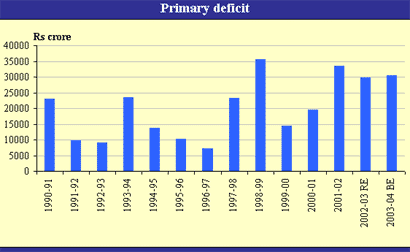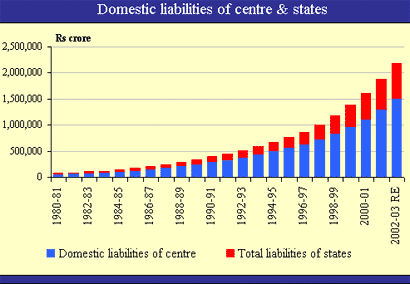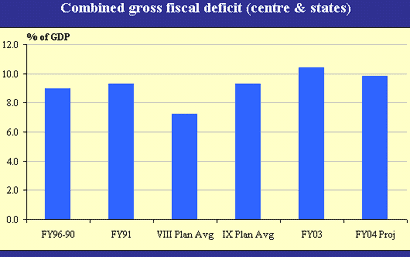|
The recent World Bank development policy review on India sounds more like an alert cautioning India on the impending dangers relating to the precarious fiscal situation. The most disturbing fact that the policy review brought out is that primary deficit and public debt are worse than 1991 levels when India had faced a major crisis. And the fact is that India's present fiscal situation is worse than that of many countries, which have faced macroeconomic crisis. 

Finance ministry's defence
The Indian finance ministry reacted with the usual approach of looking at the positive side of the report. The ministry said the World bank has not painted a dismal picture of the Indian economy and pessimistic news coverage of its report titled 'India: Sustaining reforms, reducing poverty' is based on selective and partial readings of the report. The finance ministry highlighted the point that on the reform front, the report has not warned the country about an impending economic crisis. Rather, the report has noted that rising external reserves and low levels of short-term external debt give the country a very comfortable cushion to counter any speculative attack. Thus, India is not vulnerable in the short-term to the type of collapse suffered by Russia or Argentina. The finance ministry defended itself on the public finances situation by quoting the World Bank's view on the Fiscal Responsibility and Budget Management Bill. The World Bank has said that fiscal discipline at the centre is likely to be reinforced, but not guaranteed, by the new Fiscal Responsibility and Budget Management Bill, which mandates the elimination of the centre's revenue deficit by March 2008. Three states have passed similar Acts to limit their own deficits, and others are following suit. Truth and only the truth
An objective look at dangers that the World Bank report has highlighted brings forth the point that although India is not facing a crisis as of now, it is gradually heading towards one if corrective action is not taken. This notion arises from the fact that the earlier thought-out perception about the influence of politics on economic policy gradually declining has been proved wrong.  The government's recent policy statement on putting on hold the disinvestment process as the general election is approaching bears testimony to this fact. The result is bound to result in a higher fiscal deficit. The government's recent policy statement on putting on hold the disinvestment process as the general election is approaching bears testimony to this fact. The result is bound to result in a higher fiscal deficit.
Secondly, there seems to be a lack of will on the part of the government to check fiscal deficit and public debt. The most important step in this direction is to cut on the rigid non-plan revenue expenditure, which basically means a reduction in central and state government employees. No government in a political system like one in India has the courage to take a step having political ramifications. So we cannot expect wonders on fiscal deficit to happen despite a Bill like the Fiscal Responsibility and Budget Management Bill being in place.

Crisis: Where from?
Fiscal: India's large fiscal imbalances pose a serious threat to sustained growth and development over the medium term. Although in the short run, the risk of a speculative attack is reduced by a compliant financial system, a large pool of household savers, the limited convertibility of the current account, and a flexible exchange rate. Thus, in the absence of a rapid increase in interest rates and weakening growth performance, India is not vulnerable to the type of collapse suffered by Russia or Argentina in the short term. Over the medium term, however, there are consequences of leaving the current fiscal situation unchecked. While current policies have helped reduce external vulnerabilities, they have also kept economic growth below potential, as growing interest payments have crowded out public investment, and high real interest rates have constrained private investment. Slower growth, in turn, speeds up the deterioration in debt dynamics. Even though interest rates have declined over the past 18 months, public debt dynamics have continued to worsen. As interest rates can be expected to increase from the current historical lows, the growth-interest rate ratio, which has prevented the current fiscal vulnerabilities from translating into a full-blown macroeconomic crisis, could deteriorate. The persistence of current fiscal trends will, at best, further limit growth and job creation. If this negative cycle continues, a full-fledged fiscal crisis cannot be ruled out over the medium term. The government is downplaying the risk, as it is politically easy to do so. The finance ministry is hoping that higher growth and lower interest rates will eventually solve the fiscal problem. However, experience suggests it would be unwise to sit back and wait for such a virtuous circle to emerge.  Political: An important risk is that the comprehensive reforms needed to accelerate development will be delayed due to the primacy of political concerns, such as general or state elections. Another is the diversion of policymakers' attention (and public resources) to other issues, such as the tensions with neighbouring countries. Political: An important risk is that the comprehensive reforms needed to accelerate development will be delayed due to the primacy of political concerns, such as general or state elections. Another is the diversion of policymakers' attention (and public resources) to other issues, such as the tensions with neighbouring countries.
Political obstacles to the needed hardening of budget constraints between the centre and the states, in particular those states which yield large political power, are risks that threatens to further deteriorate state level finances and discourage reforming states. There seems to be no solution to this problem as of now. External: In the short run, expected developments in the external environment cannot be expected to be strong positive forces. The recovery of the global economy is expected to be slow. There remain weaknesses in demand in the world's largest markets Western Europe, Japan, and North America. This will slowdown growth in industry, albeit to a limited extent because India still is a relatively closed economy, but in particular in services. A slowdown in the inflow of remittances is also likely. At least part of the increased inflow of remittances observed in India is likely to have been a one-off episode, motivated by the events of 9/11 in the US and resulting partly from a "flight to safety" event. This level of inflows can be expected to weaken, emphasising India's fiscal vulnerabilities. Although the government is right to set ambitious targets for growth and social development during the Tenth Plan, the key now is to implement the policy and institutional changes needed to achieve these goals. Central and state governments will have to be proactive in reducing the fiscal deficit, shifting expenditures into more productive areas, and removing structural impediments to higher private investment and productivity. The sooner the roadmap for these reforms is put in place, and concrete action taken to show commitment to follow through, the more manageable will be the adjustment path, and the quicker the pay-off in terms of higher growth and poverty reduction.
|